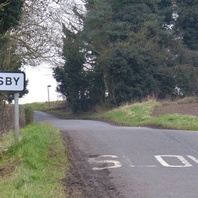
Viking Names
Frisby
Frisby, in the Gartree Hundred of Leicestershire, takes its name from a Scandinavian form of an ethnonym Frisa (gen. pl.) ‘Frisians’ and the Old Norse element by ‘farmstead, village’. This name has a similar construction to Frisby on the Wreake in the East Goscote Hundred of Leicestershire. Traditionally, the place-name has been interpreted as referring to Frisians who took part in the Viking invasions. However, the exact implications of such a name are not yet fully understood and are the subject of ongoing work by Dr Jayne Carroll of the Institute for Name-Studies, University of Nottingham.
Read More
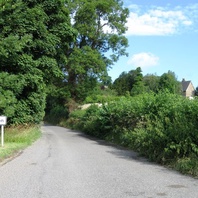
Viking Names
Kirk Ireton
The first element of Kirk Ireton, in the Wirksworth Hundred of Derbyshire, is the genitive singular or plural of the Old Norse ethnonym Íri, ‘an Irishman; probably also a Norseman who had lived in Ireland’ combined with the Old English element tun ‘an enclosure; a farmstead; a village; an estate’. Old Norse kirkja ‘a church’ was affixed at a later date. Traditionally, the place-name has been interpreted as referring to a settlement of Irishmen; probably Norsemen who lived in Ireland. However, the exact implications of such a name are not yet fully understood and are the subject of ongoing work by Dr Jayne Carroll of the Institute for Name-Studies, University of Nottingham.
Read More
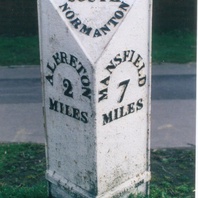
Viking Names
South Normanton
South Normanton, in the Scarsdale Hundred of Derbyshire, takes its name from the Old English ethnonym Norðman ‘Northman, Norwegian’ and the Old English element tun ‘farm, settlement’. There are several places of this name, predominantly in the East Midlands: five in Nottinghamshire, also others in Derbyshire, Leicestershire, Lincolnshire and Rutland, and one in the West Riding of Yorkshire. The prefix South distinguishes it from Temple Normanton, formally North Normanton. Traditionally, the place-name has been interpreted as referring to a settlement of Norwegians (in an area where most of the Scandinavian settlers were Danes). However, the exact implications of such a name are not yet fully understood and are the subject of ongoing work by Dr Jayne Carroll of the Institute for Name-Studies, University of Nottingham.
Read More
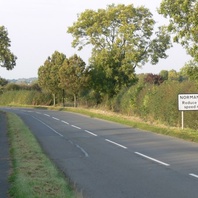
Viking Names
Normanton
Normanton, in the Framland Hundred of Leicestershire, takes its name from the Old English ethnonym Norðman ‘Northman, Norwegian’ and the Old English element tun ‘farm, settlement’. There are several places of this name, predominantly in the East Midlands: five in Nottinghamshire, and some in Derbyshire, Leicestershire, Lincolnshire and Rutland, and one in the West Riding of Yorkshire. The settlement lies in the Vale of Belvoir and previously had the affix in le Vale. Traditionally, the place-name has been interpreted as referring to a settlement of Norwegians (in an area where most of the Scandinavian settlers were Danes). However, the exact implications of such a name are not yet fully understood and are the subject of ongoing work by Dr Jayne Carroll of the Institute for Name-Studies, University of Nottingham.
Read More
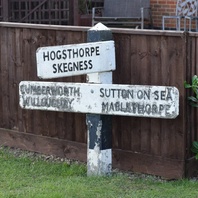
Viking Names
Cumberworth
Cumberworth, in the Calceworth Wapentake of Lincolnshire, probably comes from the Old English male personal name Cumbra and the Old English element worth ‘enclosure’. It has also been suggested that the first element is an Old English ethnonym Cumbre ‘the Cymry, the Welsh, the Cumbrian Britons’. However, the exact implications of such a name are not yet fully understood and are the subject of ongoing work by Dr Jayne Carroll of the Institute for Name-Studies, University of Nottingham.
Read More
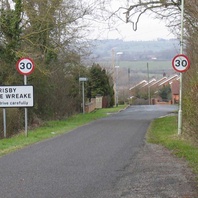
Viking Names
Frisby on the Wreake
Frisby on the Wreake, in the East Goscote Hundred of Leicestershire, takes its name from a Scandinavian form of an ethnonym Frisa (gen. pl.) ‘Frisians’ and the Old Norse element by ‘farmstead, village’. The affix ‘on the Wreake’ was added at a later date to distinguish this Frisby from another in the Gartree Hundred of Leicestershire and refers to the site’s location on the river, adjacent to Kirby Bellars. Traditionally, the place-name has been interpreted as referring to Frisians who took part in the Viking invasions. However, the exact implications of such a name are not yet fully understood and are the subject of ongoing work by Dr Jayne Carroll of the Institute for Name-Studies, University of Nottingham.
Read More
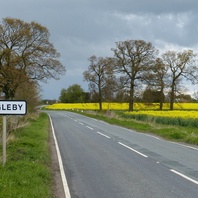
Viking Names
Ingleby
Ingleby, historically in the West Riding of Yorkshire, takes its name from the Old English ethnonym Engle ‘the Angles, later the English’ and Old Norse by ‘a farmstead, a village’. There is also an Ingleby in Derbyshire, close to the Viking winter camp at Repton, and the site of a unique Viking Age cremation cemetery. The exact implications of such a name are not yet fully understood and are the subject of ongoing work by Dr Jayne Carroll of the Institute for Name-Studies, University of Nottingham. Ingleby in Lincolnshire is now a joint parish with Saxilby.
Read More
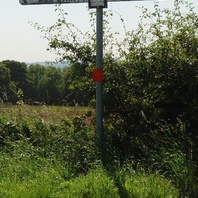
Viking Names
Saxby All Saints
Saxby All Saints, in the Yarborough Wapentake of Lincolnshire, probably takes its name from the Old Norse and Old Danish male personal name Saksi and the Old Norse element by ‘farmstead, village’. This personal name is very common throughout Lincolnshire and Norfolk. Alternatively, the first element of the place-name could be a Scandinavian gen. pl. form of an ethnonym: Old English S(e)axe, Old Norse Saksar ‘Saxons’. Thus the place-name would mean ‘Saxons’ farm/settlement’. The exact implications of such a name are not yet fully understood and are the subject of ongoing work by Dr Jayne Carroll of the Institute for Name-Studies, University of Nottingham. All Saints was affixed at a later date from the dedication of the church.
Read More

Viking Names
Bretby
The first element of Bretby, in the Repton and Gresley Hundred of Derbyshire, comes from either the Old Norse ethnonym Bretar ‘Britons’ or its Old English cognate, Brettas. The second element of the place-name is Old Norse bý ‘a farmstead, a village’. Traditionally, the place-name has been interpreted as referring to Britons who accompanied the Scandinavians in their settlements. However, the exact implications of such a name are not yet fully understood and are the subject of ongoing work by Dr Jayne Carroll of the Institute for Name-Studies, University of Nottingham.
Read More
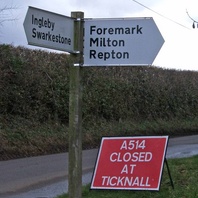
Viking Names
Ingleby
Ingleby, in the Repton and Gresley Hundred of Derbyshire, takes its name from the Old English ethnonym Engle ‘the Angles, later the English’ and Old Norse by ‘a farmstead, a village’. There is also an Ingleby in Lincolnshire (historically Yorkshire). This Ingleby is close to the Viking winter camp at Repton, and the site of a unique Viking Age cremation cemetery. The exact implications of such a name are not yet fully understood and are the subject of ongoing work by Dr Jayne Carroll of the Institute for Name-Studies, University of Nottingham.
Read More
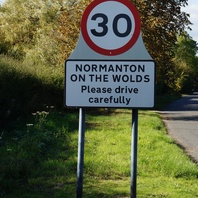
Item
Normanton on the Wolds
Normanton on the Wolds, in the Bingham Wapentake of Nottinghamshire, takes its name from the Old English ethnonym Norðman ‘Northman, Norwegian’ and the Old English element tun ‘farm, settlement’. There are several places of this name, predominantly in the East Midlands: five in Nottinghamshire, one each in Derbyshire, Leicestershire, Lincolnshire and Rutland, and one in the West Riding of Yorkshire. Traditionally, the place-name has been interpreted as referring to a settlement of Norwegians (in an area where most of the Scandinavian settlers were Danes). However, the exact implications of such a name are not yet fully understood and are the subject of ongoing work by Dr Jayne Carroll of the Institute for Name-Studies, University of Nottingham.
